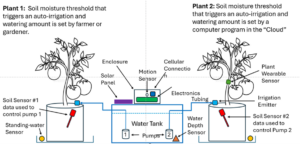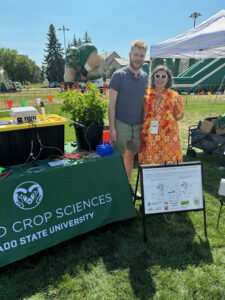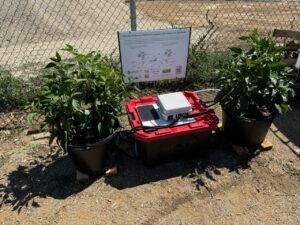Progress report for WPDP24-021
Project Information
We have developed high-quality, low-cost soil moisture probes that can significantly improve irrigation efficiency when used to automate watering. In this proposal, we couple this technology with an Upskilling micro-credentialed hands-on training kit with self-paced online learning. This training and technology is especially relevant for urban and peri-urban food production along Colorado’s Front Range. The Food Access Research Atlas shows that Denver, Loveland, and Fort Collins, CO, have significant low-income community populations with minimal access to fresh food. Unfortunately, this same urban area is prone to water restrictions and increasing water costs – making urban food production challenging in this arid zone. This project partners with urban food producers to create demonstration experiments to help our urban clientele see first-hand the impacts of precision irrigation tools and practices on crop and vegetable yields while reducing water use and costs. Stakeholder partners will follow a training program on Soil Internet-of-Things (IoT) technology using a hands-on kit that also teaches crucial irrigation principles. The program will follow cognitive science research, utilizing “Fit-Bit for Learning” and “Coaching Circle” models, which have proven successful in longer-term learning that better leads to behavior changes. This program pilot will empower Urban Ag Leaders to offer subsequent sensor-based irrigation training in their education/outreach programs. In addition, the micro-credential earning opportunity will also provide skills documentation for any participant, thereby allowing for potential new career pathways. It is often stated that “Colorado Runs on Water,” which is more true today with drought, water shortages, and climate change looming along the Front Range. With the rapidly growing urban population, we must train tech-savvy urban growers who can produce fresh food while conserving water resources.
The Project Objectives to be achieved by 2025 span three inter-connected sub-groups that we are
targeting.
1) Urban Food Innovators (“Trainers”)
- Through participation in the Urban Food Innovators program, participants will gain...
- Awareness of AI applications in urban food production.
- Longer-term knowledge of precision irrigation principles and their use in urban food production.
- Skills for utilizing soil sensing and IoT technology in urban food production.
- Skills in designing irrigation experiment demonstrations.
- Skills in implementing the U-Behavior principles for improved learning for those they train.
2) Employees/Staff at Urban Food Innovator Locations
- Increased knowledge of precision irrigation principles and their use in urban food production.
- New skills for utilizing soil sensing and IoT technology in urban food production.
- Skills in managing experiment demonstrations.
3) Visitors to Urban Food Innovator Locations
- Increased awareness of precision irrigation principles and use in urban food production.
- Improved knowledge of soil sensing and IoT technology in urban food production.
- Expanded Interest in pursuing agriculture careers.
Project Year 1
(April 2024) Phase 1 – Urban Food Innovator in-person onboarding workshop with 10-20 stakeholder partners to explore their specific irrigation challenges, discuss how to use the Soil Sensing IoT probes and online training badge materials. Establish goals for and plan out Coaching Circles, site specific demonstration experiments, as well as community outreach activities. Connect group to the accompanying online badge courses for those wishing to dive deeper and earn a badge for their career. Expected outcomes: 10 –20 participants.
(May – October 2024) Phase 2 - Urban Food Innovators complete online micro-credential badge (optional), set up and run on-site experiment demonstrations including data collection, and implement outreach activities. Weekly-biweekly virtual Coaching Circle check-in sessions available to troubleshoot and to compare what each site is learning. Expected outcomes: 7-15 participants in Coaching Circles and set up experiments (with 200 staff/volunteers), 5 complete badge courses.
(November 2024) Phase 3 - End of growing season Urban Food Innovator and their guests come back together to tour each urban food farm/garden to see experimental results and to hear what was learned. Expected outcomes: 20 participants in tours. 1500 visitors to experiment demonstrations.
(December 2024-January 2025) Evaluation and Reflection - Analyze Urban Food Innovator feedback and experiment plot data to measure impacts and progress towards overall project goals. Make adjustments for Year 2. Expected outcomes: Knowledge gain in 10 Urban Food Innovators, 200 staff/volunteers and awareness gains by 1500 visitors.
(Feb-March 2025) Recruit next co-hort of 10 new Urban Food Innovator joining first co-hort.
Project Year 2
Repeat project cycles/phases and calendar target dates implementing modifications based on lessons learned in 2024. Expected outcomes: Similar or greater than Year 1.
Cooperators
- (Researcher)
- (Educator)
- - Producer
- - Producer
- (Educator)
Education
Our team used the Design Thinking Process to research, evaluate, and better understand the needs of our urban agriculture collaborators (ie urban farms/gardens). What this means is our urban ag collaborators are co-developers with us in all aspects of the program. We started first with a focus group to learn more about their specific needs, constraints and opportunities. We used the information gathered through this process to improve our hands-on learning kit and training program approaches before piloting them. This agile development approach has been shown to produce end products better aligned with customer needs.
Our focus group work was then followed with major redesigning of the IoT/AI learning kit and rethinking how to conduct training in a manner that better aligned with our stakeholder needs. We then pilot tested the redesigned IoT/AI kit with Loveland Youth Gardeners and Colorado State University’s horticulture Trial Garden program, both of which see large numbers of public visitors. Our team also created an on-demand, micro-training approach to education. Input and lessons learned from the focus group and pilot work have positioned our team for a large roll out in the 2025 growing season.
Education & Outreach Initiatives
Urban Food Innovators (“Trainers”) - Through participation in the Urban Food
Innovators program, participants will gain...
1) Awareness of AI applications in urban food production.
2) Longer-term knowledge of precision irrigation principles and their use in urban
food production.
3) Skills for utilizing soil sensing and IoT technology in urban food production.
4) Skills in designing irrigation experiment demonstrations.
5) Skills in implementing the U-Behavior principles for improved learning for those
they train.
- Focus Group: Five urban ag partners participated in an online focus group held in April 2024. They summarized their organization's key learning objectives for participating in the SARE project and provided input on their needs, limitations, and ideas for experiment demonstrations.
- IoT/AI Kit Redesign: Based on input from focus group participants the IoT/AI hands-on learning kit was significantly changed.
- Pilot Experiment Demonstration: Using the revised IoT/AI kit and an experiment demonstration plan, our team worked with one urban ag partner to set up and run this pilot the end of the summer.
The outcomes of the focus group included 1) Urban Ag partners’ (and their teams) baseline skillsets varied and most would benefit from foundational training on using AI tools for improving irrigation efficiencies, 2) Employees and volunteers have very limited time available for training, and 3) Personnel changes occur frequently indicating a need for innovate approaches to training and engagement. This evaluation indicated a need to pivot from the in-person one day training event to more on-demand online micro-learning and one-on-one assistance from our team.

Given this valuable input, we spent much of the summer 2024 redesigning the learning kit. We developed a more stand-alone experiment demonstration set up in which one kit was powering 2 different irrigation pumps for 2 potted plants. One plant was water completely by AI and the other with IoT and user driven decisions.
Our revised approach will increase the impacts of this project by helping participants better access, use and apply the key concepts offered in this funded grant proposal.
- The input obtained was very valuable and we significantly modified our IoT/AI learning kit, as well as our training approaches. The 5 Urban Ag Innovator Participants identified key specific goals including learning to:
- Increase water conservation/decrease water use.
- Use natural resources more wisely in an effort to increase conservation and decrease costs.
- Improve soil health.
- Increase food production.
- Learn how to use ag technology to solve 1-4 now and into the future.
- Urban ag partners self-reported time constraints that prevented them from participating in workshops. Our grant team used this insight to utilize one-on-one consultations as our initial program delivery method.
- Initial consultations with partners also identified a need to significantly modify our hands-on learning kit. Their input helped us perfect the design of the educational demonstration to better meet participant needs and improve the user interface. For example, not all of our urban partners have electricity at their sites and very few had reliable Wi-Fi access. Example modifications completed:
- Educational demonstrations have been converted from Wi-Fi to cellular internet, so they work in locations where partners need to use them. For example, we learned that they don’t have Wi-Fi in garden areas; however, cellular service can run the demonstrations in these areas.
- A solar powered energy source was added so that partners without electricity on site or garden locations not near an outlet can use the IoT/AI technology.
- An automated people counter now tracks the number of people who observe the educational demonstration. Others in Extension have learned about this technology from our project and are interested in adopting it for their programs.
Employees/Staff at Urban Food Innovator Locations will gain:
1) Increased knowledge of precision irrigation principles and their use in urban food
production.
2) New skills for utilizing soil sensing and IoT technology in urban food production.
3) Skills in managing experiment demonstrations.
It took longer than expected to incorporate all the necessary revisions to the hands-on IoT/AI learning kit, taking us to near the end of the summer 2024 growing season. We piloted this new design and new one-on-one approach to education with one garden manager at a partner Urban Community Garden location.
Planned 2025 Activities
- On-demand Training: Many employers now experience high levels of employee turnover. This is also true with urban agriculture groups. To accommodate the ongoing training which will be needed as new employees onboard, we will develop online on-demand training showing how to set up and maintain the experiment demonstrations.
- Roll-out Program: We are now poised to expand our work with 15-20 additional urban agriculture programs the 2025 growing season.
- Pilot Experiment Demonstration:
- One garden manager was trained in a one-on-one session and successfully maintained the experiment demonstration for the end of the growing season.
- The participating organization realized the benefits of an AI enhanced irrigation system and want to expand it to additional garden plots in 2025. The community garden group was surprised to see the increased pepper production compared with what they normally are able to grow.
- The participating organization increased their knowledge of precision irrigation principles in urban food production and learned how to use soil sensing and IoT technologies in food increase production. We are excited to expand this project in 2025 knowing that our pilot met and exceeded these objectives.
- In our testing of using tomato plants and pepper plants in the experiment demonstration, we found the pepper plants worked better. They grow quickly, respond well to irrigation and participants enjoy harvesting them (very visual).
- Also in our testing, we discovered that yellow lids on the water reservoir tubs attracted yellow jacket wasps. They made nests inside, so we switched to red lids to solve the issue.
- Ten experiment demonstration kits were created and are ready to use early 2025. Additional kits can quickly be made following that prototype.
Visitors to Urban Food Innovator Locations will gain an...
1) Increased awareness of precision irrigation principles and use in urban food
production.
2) Improved knowledge of soil sensing and IoT technology in urban food production.
3) Expanded Interest in pursuing agriculture careers.
Several public outreach activities were conducted. These pilots helped us to test our new kit design for use in an experiment demonstration and an informational poster.
- Pilot Experiment Demonstration: An experiment demonstration was set up at one community garden location as a pilot test.
- CSU Trial Gardens: On the CSU Fort Collins campus is an area where new varieties of flowers and vegetables are being tested. The area is open for the public to walk by at any time. We worked with the leaders of this group to place our IoT/AI Experiment Demonstration at this location.
- Ag Day Demonstration: Our first major educational demonstration was held in September 2024 at Colorado State University’s Ag Day Demonstration. This annual, historical annual event
 is held during a home football game and is used as an opportunity to highlight agriculture. Our goal was to teach people that it is possible to get more crop per drop.
is held during a home football game and is used as an opportunity to highlight agriculture. Our goal was to teach people that it is possible to get more crop per drop.
- Pilot Experiment Demonstration: One community garden partner successfully maintained their demonstration and indicated approximately 550 public members visited the demonstration.
- CSU Trial Gardens: According to our automatic counter, approximately 200 people visited the pilot demonstration.
- Ag Day Demonstration: Our team's presentation emphasized ag tech and the "crop per drop" concept. The experiential educational demonstration drew attention and supported a constant flow of people interested in learning more. The demonstration asked questions like, “How many tubs of water does it take to produce plants?” and demonstrated the concepts that ag tech helps produce more food for less water. The approximate 400 participants included statewide ag groups, key ag stakeholders and decisions makers, university administration, Colorado extension, college and high school students and youth. People reported that they enjoyed harvesting peppers from the demonstration plants.
Educational & Outreach Activities
Participation summary:
Learning Outcomes
Project Outcomes
The initial part of this project has been instrumental in helping us obtain additional foundation funding, as well as being able to use this same kit redesign and modified training approach for a USDA-FANE project funded fall 2024. The additional funding will help our team expand this project to more stakeholders and places over a longer period of time.
Experiential learning demonstrations helped our team reach more than 1,400 total learners and participants at outreach and educational events.
The new Dean of Agricultural Sciences observed our educational demonstration at the 2024 Colorado State University’s Ag Day Demonstration. She was impressed by the demonstration and asked Dr. Jay Ham (one of our Co-PIs on this project) to provide soil moisture probes to the Board of Governors, which helped disseminate the information about the project and potential impacts to key decision makers.
Having seen the benefits from the experiment demonstration and learning the skills needed to run the technology, the piloting community garden center is now wanting to implement this precision irrigation technology on their garden plots and their irrigation system.
In addition to the urban agriculture partners on our project, three additional outdoor education centers located in mountain regions will be joining in 2025. They are interested in teaching the youth who come through their programs, as well as improving their own ranch conditions. One partner has received a SARE grant in the past, so this is a wonderful expansion.
Also in this project, we updated five online irrigation lessons, as well as three IoT soil sensing lessons which will support the on-demand training we will be expanding in 2025. The new kits also allow us to monitor if participants have been using it. If we notice a gap, we can reach out to determine if they have questions or needing further training.
2024 Additional Outcomes:
- Kit Redesign: Because of the work completed with our learning kit redesign, we are able to use this same kit for a pitch we made to CHS Foundation for additional funding. We were awarded a grant from them in Jan 2025 and also a USDA-FANE grant, building on this work. We are able to use this same kit and modified on-demand micro-training approach for Colorado high school teachers in agriculture and computer science programs (starting spring 2025). We hope to also connect these teachers with their local community gardens to set up SARE experiment demonstrations that they can help monitor.
